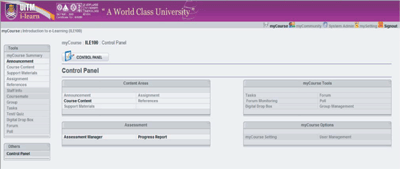Indian Internet companies Mercantila, TutorVista getfunding
 Two India-based Internet companies Mercantila and TutorVista, catering mainly to customers in the United States, have received US$29.5 million funding from Lightspeed Ventures Partners.
Two India-based Internet companies Mercantila and TutorVista, catering mainly to customers in the United States, have received US$29.5 million funding from Lightspeed Ventures Partners.
While Mercantila, an online retail venture, has received US$22.5 million funding from LVP, TutorVista, an online tutoring company, has received US$7 million funding from the investors. TutorVista was set up in November 2005 to offer online tutoring. It received a first round of funding of US$2 million from Sequoia India in May 2006.
Lightspeed is looking for more Indian ventures to finance and May invest about US$100 million to US$150 million in India in the next
few years.
Reliance to carry FLAG far and wide
Reliance Communications is all set to expand FLAG Telecom’s global optic fibre network, as FLAG will build the world’s largest IP network over submarine cable systems, over the next 36 months. Called FLAG Next Generation Network (NGN), the project will cater to the telecom needs of over five billion customers across the globe.
FLAG Global Network would have the capability to carry 2.5 billion simultaneous voice calls, 300 million simultaneous webchats, 52 million simultaneous video chats and enabling 20 million students in educational institutions of India to offer e-learning simultaneously. On completion, FLAG Global Network would span over 1,15,000 km by December 2009 taking the total optic fibre assets of Reliance Communications Group to over 2,30,000 km.
New Cisco Academy launched at St Michael’s Foundation
Investment, Industry and IT Minister Austin Gatt has launched the first of a series of five new Cisco academies in Malta, at the St Michael’s Foundation.
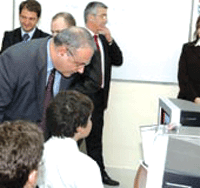 The first Cisco academies in Malta were opened in 2002 at the Swatar Training Centre, the University of Malta and MCAST. Through these three academies, some 700 individuals have followed Cisco courses to date.
The first Cisco academies in Malta were opened in 2002 at the Swatar Training Centre, the University of Malta and MCAST. Through these three academies, some 700 individuals have followed Cisco courses to date.
The Cisco Academy set up at St Michael’s is special, because the school took a brave and innovative step as a secondary school to integrate the IT Essentials curriculum in the full-time ICT curriculum taught at Forms III, IV, and V.
iLink creating Saturday university
iLink Systems Inc. launched a unique Saturday University program (http://blog.ilink-systems.com/default.asp?Display=4) for all it employees in their offices spread across Bellevue (WA), Fairfax (VA) and Chennai (India).
A University calendar was published for the first trimester and it included an unprecedented 76 training hours in that period. Annualised, this works out to 28.5 training days per employee every year; well above the annual training provided to software employees in most organisations.
Subject matter for the training was spread over a wide variety of areas, predominantly based on the latest Microsoft Technologies, but also on building domain competence like business intelligence and soft-skills including communication and presentation skills. Training methodo-logies were also varied including formal training, in-house presen-tations, e-learning and self-study.
Global IT services spending to grow 8%
Global IT services spending is likely to increase at around 7-8 per cent over the medium term to $500 billion in 2007 from $470 billion in 2006.
According to a report by Icra, IT services spending is likely to be driven by strong forecast GDP growth of 3.5 per cent in the US, moderate increase in IT spending in the US, and strong growth in IT spending in emerging markets.
For Indian companies, growth is expected at around 28-30 per cent in the medium terms, driven more by reallocation of corporate budgets from internal to external spending rather than growth in aggregate IT spending.
Although communications products and services represent the largest single category of ICT spending in 2006 with $1.57 trillion, software is the fastest growing category with annual growth of 10 per cent.
Aptech opens training centre in Malaysia
Indian global learning solutions giant, Aptech Limited officially opened its maiden office in Kuala Lumpur, Malaysia. At the launch, Aptech also announced the inauguration of a high-end training centre located at Antarabangsa, in the heart of the Golden Triangle in Kuala Lumpur.
Aptech initially plans to offer services & solutions to individuals, corporates and academic institutions in Malaysia and later address the client’s needs across South East Asia. Aptech has been operating in Malaysia in partnership with Human Resource Development Corporation (PSMB) and Cosmopoint since 2002.
Under this special partnership, Aptech has provided high end software development training to over 1000 IT graduates and has an excellent 98% post training job placement record.
The IT outsourcing wave has been driving India’s economic growth and India continues to dominate as the preferred provider for global e-learning solutions. In recent years, the escalating demand for e-learning and certification coupled with the lack of globally-recognised solution providers, has led Aptech to expand rapidly.
Open document format push
IBM Malaysia is taking strides to push the OpenDocument Format (ODF) concept into the public sector. These include educating the various Government agencies of the advantages of ODF, providing suggestions on the ODF migration paths, and helping in solving certain issues that crop up. Last year, Thailand, China and Japan were some of the nations to endorse a position paper from Harvard University that supports software based on open standards. And in June, the Thai government held a summit of many Asian nations which agreed to explore its adoption. India, the Philippines and Thailand are running pilot programs for ODF.
Research company Gartner has predicted that by 2010, ODF will be required by 50 per cent of the governments worldwide and 20 per cent of commercial organisations.
Satyam to set up 2,000 seat development centre in Malaysia
 Satyam Computer Services, the country’s fourth largest software exporter, said it will set up a 2,000-seat software engineering global delivery campus in Malaysia.
Satyam Computer Services, the country’s fourth largest software exporter, said it will set up a 2,000-seat software engineering global delivery campus in Malaysia.
The company would increase the headcount to 2,000 over the next four years as part of steps to strengthen foothold in Malaysia. The campus would serve as a major technological development and software support facility for its ASEAN, US and Middle-Eastern clients. The campus is in addition to the 100-seater global solution center (GSC) established about three years back.
The GDC would be established along with Malaysias Multimedia Development Corporation (MDEC), which oversees the Multimedia Super Corridor (MSC) initiative. The current staff strength of Satyam is 150 employees of which majority are Malaysians. It launched its first mass recruitment program for fresh graduates outside India in 2004.
Till date, more than 65 Malaysian engineering graduates have been trained by the organisation and absorbed as full time employees at the global solution center in Kuala Lumpur.
IT grants for United Voice and Prihatin
 Those with learning disabilities can now converse more eloquently with a picture-to-speech communicator PDA. The gadget is one of the technology-breaking projects funded by Samsung Digital Hope 2006.
Those with learning disabilities can now converse more eloquently with a picture-to-speech communicator PDA. The gadget is one of the technology-breaking projects funded by Samsung Digital Hope 2006.
The Samsung Digital Hope grant programme, which is into its fourth year, recently awarded US$620,000 to 16 organisations from South-East Asia and Australia. Two of the beneficiaries are from Malaysia. They are Pertubuhan Prihatin Sosial Malaysia’s E-Community Technology Centre for Unemployed Youths, a recipient of the grant for the second consecutive year, and United Voice, which provides social, communication and leadership skills, and forums on issues related to people with learning disabilities.
Pertubuhan Prihatin Sosial Malaysia (Prihatin) was awarded RM255,000 while United Voice received RM34,000. 







 Two India-based Internet companies Mercantila and TutorVista, catering mainly to customers in the United States, have received US$29.5 million funding from Lightspeed Ventures Partners.
Two India-based Internet companies Mercantila and TutorVista, catering mainly to customers in the United States, have received US$29.5 million funding from Lightspeed Ventures Partners. The first Cisco academies in Malta were opened in 2002 at the Swatar Training Centre, the University of Malta and MCAST. Through these three academies, some 700 individuals have followed Cisco courses to date.
The first Cisco academies in Malta were opened in 2002 at the Swatar Training Centre, the University of Malta and MCAST. Through these three academies, some 700 individuals have followed Cisco courses to date. Satyam Computer Services, the country’s fourth largest software exporter, said it will set up a 2,000-seat software engineering global delivery campus in Malaysia.
Satyam Computer Services, the country’s fourth largest software exporter, said it will set up a 2,000-seat software engineering global delivery campus in Malaysia. Those with learning disabilities can now converse more eloquently with a picture-to-speech communicator PDA. The gadget is one of the technology-breaking projects funded by Samsung Digital Hope 2006.
Those with learning disabilities can now converse more eloquently with a picture-to-speech communicator PDA. The gadget is one of the technology-breaking projects funded by Samsung Digital Hope 2006.
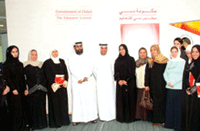 Dubai Education Council honoured 200 teachers of the 'I-Teach' programme. 'I-Teach' is an IT Training Programme for Teachers who have been awarded the Cambridge International Diploma in teaching with ICT.
Dubai Education Council honoured 200 teachers of the 'I-Teach' programme. 'I-Teach' is an IT Training Programme for Teachers who have been awarded the Cambridge International Diploma in teaching with ICT.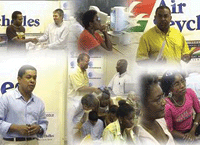 This follows the first round of intensive training in a project to implement Information and Communication Technology (ICT) in primary schools as from next year. The aim is to ensure that teachers have access to the latest technology to help them in delivering their lessons to improve pupils' learning.
This follows the first round of intensive training in a project to implement Information and Communication Technology (ICT) in primary schools as from next year. The aim is to ensure that teachers have access to the latest technology to help them in delivering their lessons to improve pupils' learning.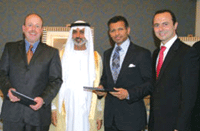 The initiative, the first of its kind in the region, will include development of the 'School of the Future', a visionary educational model that is rooted in empowering the school community through continuous, adaptive and relevant learning. The entire programme will be supported through Microsoft certified training for teachers and the installation of Microsoft certified ICT labs.
The initiative, the first of its kind in the region, will include development of the 'School of the Future', a visionary educational model that is rooted in empowering the school community through continuous, adaptive and relevant learning. The entire programme will be supported through Microsoft certified training for teachers and the installation of Microsoft certified ICT labs. 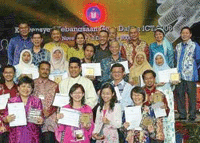 Many teachers in Malaysia are adept at Information and Communication Technology and even capable of servicing and maintaining computers in schools. According to Education Minister Datuk Seri Hishammuddin Tun Hussein, this was clear from the way teachers were able to handle high-tech gadgets like laptops and overhead projectors.
Many teachers in Malaysia are adept at Information and Communication Technology and even capable of servicing and maintaining computers in schools. According to Education Minister Datuk Seri Hishammuddin Tun Hussein, this was clear from the way teachers were able to handle high-tech gadgets like laptops and overhead projectors. The Klang Valley will be turned into a Multimedia Super Corridor (MSC) in stages, according to Malaysia's Prime Minister Datuk Seri Abdullah Ahmad Badawi.
The Klang Valley will be turned into a Multimedia Super Corridor (MSC) in stages, according to Malaysia's Prime Minister Datuk Seri Abdullah Ahmad Badawi.  What impact will eInfrastructures have on distance and eLearning? Case studies from European and Indian leaders explored the future of Distance and eLearning in the conference by harnessing the power of eInfrastructures. M.M.Pant from Planet Edu Pvt (India), Prof. Krithi Ramamritham, from the Bombay IIT, and Prof. Pierluigi Ritrovato, CRMPA-Centre of Excellence for Learning and Knowledge set out to answer many such similar questions. Prof. Ritrovato presented the European perspective to the session and helped demonstrate to the BELIEF audience how can Europe and India collaborate given their mutual strengths, skills and knowledge in eInfrastructures. The European Learning Grid Infrastructure (EU funded) project concern with use of Grid technologies for supporting the implementation and adoption of pedagogy driven, user centred learning model, enabling experiential based and contextualised learning approaches. Information on the ELeGI software architecture for formal learning, defined as a Domain Specific Grid based Service Oriented Architecture, was provided highlighting the innovative design process followed in order to guarantee the compliant with respect to the pedagogical model
What impact will eInfrastructures have on distance and eLearning? Case studies from European and Indian leaders explored the future of Distance and eLearning in the conference by harnessing the power of eInfrastructures. M.M.Pant from Planet Edu Pvt (India), Prof. Krithi Ramamritham, from the Bombay IIT, and Prof. Pierluigi Ritrovato, CRMPA-Centre of Excellence for Learning and Knowledge set out to answer many such similar questions. Prof. Ritrovato presented the European perspective to the session and helped demonstrate to the BELIEF audience how can Europe and India collaborate given their mutual strengths, skills and knowledge in eInfrastructures. The European Learning Grid Infrastructure (EU funded) project concern with use of Grid technologies for supporting the implementation and adoption of pedagogy driven, user centred learning model, enabling experiential based and contextualised learning approaches. Information on the ELeGI software architecture for formal learning, defined as a Domain Specific Grid based Service Oriented Architecture, was provided highlighting the innovative design process followed in order to guarantee the compliant with respect to the pedagogical model Some of the speakers in Europe included representatives from:CNRS-IN2P3 (France), Copenhagen Business School (Denmark), D – Grid (Germany), Eindhoven University of technology (Netherlands), Enginnering (Italy), GEIE ERCIM (France), GRNET (Greece), INFN Cagliari (Italy), Infra Technologies (France), KTH (Sweden), Martel GmbH (United Kingdom), Poznan Supercomputing (Poland), RENATER (France), University of Salerno (Italy).
Some of the speakers in Europe included representatives from:CNRS-IN2P3 (France), Copenhagen Business School (Denmark), D – Grid (Germany), Eindhoven University of technology (Netherlands), Enginnering (Italy), GEIE ERCIM (France), GRNET (Greece), INFN Cagliari (Italy), Infra Technologies (France), KTH (Sweden), Martel GmbH (United Kingdom), Poznan Supercomputing (Poland), RENATER (France), University of Salerno (Italy). For the purpose of this study, every group member is given a role and one of the members played the role of a leader. The next step is allocating a problem base question to the group in the discussion board. The instructor in early week 3 posted the question. Each student is then required to post discussion base upon their role also to respond to their group members. As this is a group work, each member of the group is required to help each other to solve the problem.
For the purpose of this study, every group member is given a role and one of the members played the role of a leader. The next step is allocating a problem base question to the group in the discussion board. The instructor in early week 3 posted the question. Each student is then required to post discussion base upon their role also to respond to their group members. As this is a group work, each member of the group is required to help each other to solve the problem. 
 Students from NE States steal the show
Students from NE States steal the show The winners in all three categoriessub-junior, junior and senior — were from the north and some of them were from Meghalaya and Assam. Some of the winners, such as Bhargob Gogoi and Tanya Gupta from Uttar Pradesh, were flown into Chennai by the organisers only on the previous day of the event and were visiting the city for the first time
The winners in all three categoriessub-junior, junior and senior — were from the north and some of them were from Meghalaya and Assam. Some of the winners, such as Bhargob Gogoi and Tanya Gupta from Uttar Pradesh, were flown into Chennai by the organisers only on the previous day of the event and were visiting the city for the first time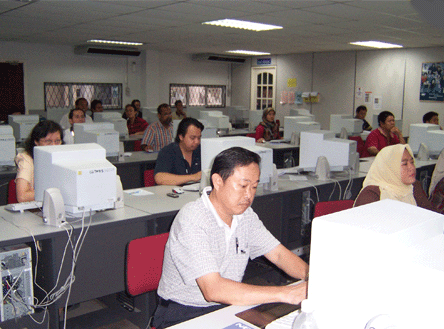
 Universiti Teknologi
Universiti Teknologi 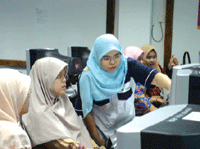 The university has the broadest range of disciplines that any one university can boast of-from hotel and tourist management to accountancy to communication and media studies to medical and health technology, encompassing 25 faculties and 250 academic programmes spread over Science and Technology, Social Sciences and Humanities and Business Management.
The university has the broadest range of disciplines that any one university can boast of-from hotel and tourist management to accountancy to communication and media studies to medical and health technology, encompassing 25 faculties and 250 academic programmes spread over Science and Technology, Social Sciences and Humanities and Business Management.